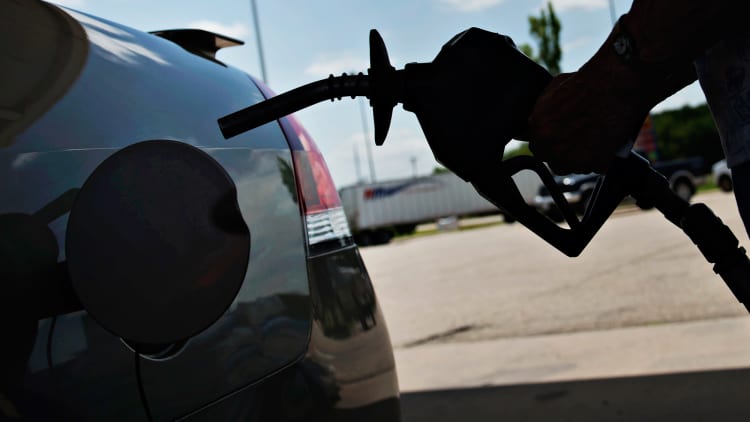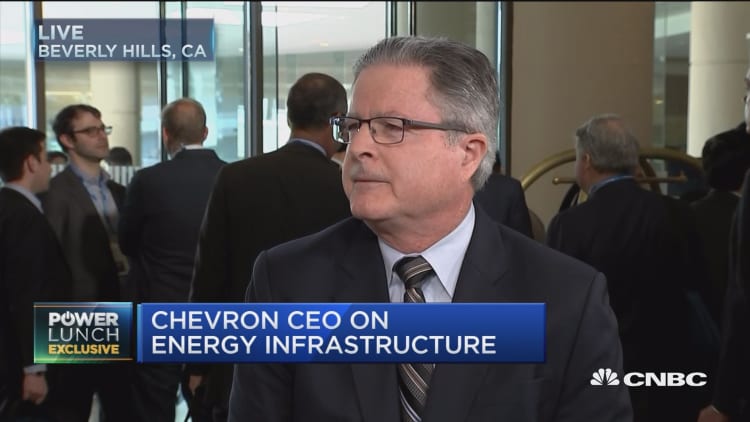
President Donald Trump said Monday he would consider raising the federal tax on gasoline to help pay for infrastructure spending that is the core of his economic plans.
"It's something that I would certainly consider," Trump told Bloomberg News. A higher gas tax has the support of truckers "if we earmarked money toward the highways," he claimed.
White House press secretary Sean Spicer later clarified that the president has not yet endorsed raising the gasoline tax. Instead, Trump would consider doing so out of respect for an unnamed group that had brought the idea to him, Spicer said.
"What the president said during that interview is that folks from the industry had come to him and expressed to him how the deteriorating roads were affecting their ability to deliver goods and services throughout this country, and that they had expressed a willingness to see something like that as a way to help pay for and repair the roads and bridges," Spicer said in a briefing with reporters.
The International Brotherhood of Teamsters, whose 75,000 members include truck drivers, told CNBC that the organization had no statement on Trump's comment at this time.

The current federal levy is 18.4 cents a gallon on retail gasoline and 24.4 cents a gallon for diesel, according to the Energy Information Administration. The average state tax on gasoline was 27.3 cents as of Jan. 1.
The federal government has not raised the excise tax on gasoline since 1993. Revenue from the levy goes to the Highway Trust Fund, which pays for road construction and mass transportation.
Trump infrastructure advisor and real estate developer Richard LeFrak told CNBC on Monday the president had shown courage in addressing what has historically been "the third rail of politics." He noted that a number of states have recently "bitten the bullet" by raising gas taxes, adding that he believes the Trump administration will now consider doing so.
"The reason to raise it is to invest money in the roads and the infrastructure of the United States," he said in a "Power Lunch" interview on the sidelines of the Milken Institute Global Conference in Los Angeles.
"It's a hard sell but we have a crumbling infrastructure. The money has to be spent and the users should have some responsibility for paying for it," the chairman and CEO of the LeFrak Organization said.
Gasoline prices have remained relatively low in recent years amid a nearly three-year downturn in the cost of crude, the raw material for most fuels. The average price at the pump in the United States on Monday was $2.371, up about 15 cents from a year ago, according to GasBuddy.com.
U.S. gasoline futures have been trading lower in recent weeks as tepid demand and high refinery activity have contributed to rising U.S. stockpiles of the fuel. They were down about 1.3 percent on Monday.

Chevron CEO John Watson on Monday did not immediately support a federal gas tax hike to pay for infrastructure. Instead, he suggested reviewing existing taxes to make sure they do not already have the potential to fund infrastructure needs.
"I think a good first step would be to evaluate where existing taxes are going. In other words, we have road taxes today. How are they being used? Are they being put to good use in rebuilding our infrastructure?" he told CNBC's "Power Lunch," also on the sidelines of the Milken conference.
"If we don't have existing funds, then we can consider other funding mechanisms," he said.
Chevron is one of the world's largest integrated energy companies. Higher gasoline prices could crimp demand and potentially hurt its retail operation, which sells gasoline to consumers. Weaker demand could also spill over into its fuel refining and oil and gas exploration and production businesses.


